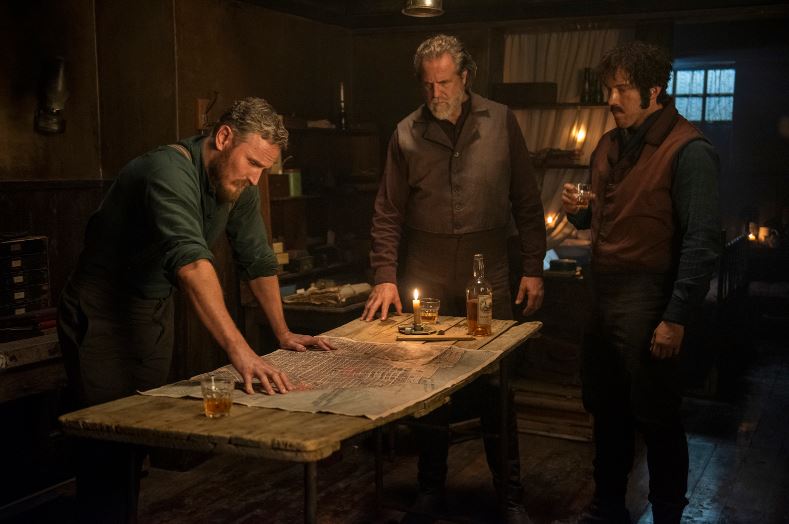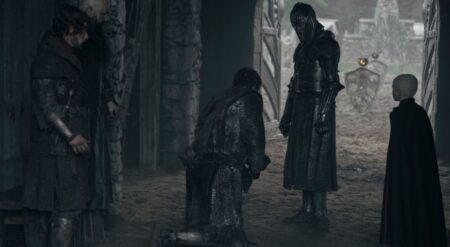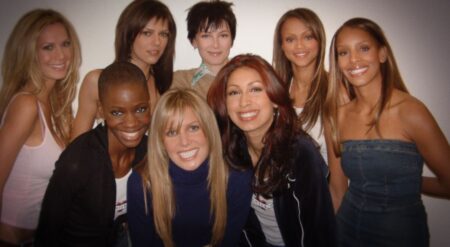Warrior, a Cinemax Original series based on the writings of Bruce Lee, has been a phenomenal Western drama with showstopping martial arts fight choreography as well. Last episode, Young Jun (Jason Tobin) realized his falling stature in the Hop Wei, Mai Ling (Dianne Doan) is losing power to the Fung Hai, and Bill’s (Kieran Bew) family comes under attack after he attempts to leave the Fung Hai’s employ. Now, in Warrior Episode 4, “If You Don’t See Blood, You Didn’t Come to Play,” we see the impact of the Fung Hai attack on Bill’s family. The story focuses on the Irish and wealthy white characters for the majority of its runtime.
While the immediate draw of Warrior was the way it decentered whiteness from stories about the American West, I’ve come to love the entire cast and their stories, and that includes Bill, Lee, Penny (Joanna Vanderham), and Leary (Dean Jagger). While I don’t find myself rooting for them — I mean, because of the racism of it all — because of their power we see the impacts that their hardships and decisions have on Chinatown. And that’s just what Warrior Episode 4 accomplishes, mapping out the larger narrative around San Francisco and how they’re all pushing in on Chinatown.
We see this when Nellie (Miranda Raison), the wealthy white widow who has made it her mission to save Chinese women in San Francisco, meets Ah Toy (Olivia Cheng) in her brothel and tries to “save” her too. We also see this as Ah Sahm (Andrew Koji) begins giving Penny’s factory protection and he comes head to head with Leary. This is exacerbated when Penny’s sister becomes more involved with the Irishman and helps him plan another bombing. Even further, we see how Bill’s fellow officers are seeking to enact revenge for the attack on his house.
Additionally, Warrior has been dealing with themes of race since episode one and has done so deftly. That said, this episode is probably the first time the intersection of gender and class have come so overtly to the surface. This is particularly true with Penny as she begins to fight her husband, the mayor, not only for power in the household but also to retain her standing as a businesswoman.
Additionally, Penny is fighting her sister. Penny, having married the mayor to save her family’s business, carries that weight and sacrifice while her sister goes to bars and reaps the benefits. That said, the clearest moments of Warrior Episode 4 that dive into what it’s like to be a woman in the West are when Ah Toy and Mai Ling are involved. Additionally, this episode dives into the intersection of where gender, class, and race meet.

In the first scene, we see Nellie coming to pick up a girl from Ah Toy’s brothel. Having chosen to leave with Nellie, Ah Toy explains that she is allowed to leave because she doesn’t force any girl in her brothel to work in her establishment. She explains to Nellie, that each girl makes a choice, to which Nellie responds that they just don’t know they can have something else. This is a moment where Cheng’s performance as Ah Toy shines.
When Nellie says this, there is a moment where Cheng emotes a face I know all too well, as if asking what else can the girls do? They are Chinese women, and in a racist world where they’re pushed to hard labor, Ah Toy sees her brothel as a place of agency. Ah Toy sees her establishment as a place of choice, a place where her and her girls choose to use their sexuality like a weapon for success in a world that has made sex their only skill.
To put it plainly, it’s easy for a wealthy white widow to say there is a different life to be had when this isn’t the reality for many of the women she is housing in her brothel. While this is a relatively quick scene, it speaks volumes and is a reflection of the way white women can enact what they view as empowerment while women of color aren’t afforded the same privilege yet chided for not acting the way the privileged see fit.
The second scene where the women get to shine is when Mai Ling and Ah Toy meet for the first time. Mai Ling and Ah Toy are similar. They have power. They have status. But, they achieved them in different ways.Mai Ling is the leader of the Long Zii, and as such, the leader of a group of men and constantly has to interact with other powerful men. Because of this, she is constantly underestimated and disrespected. So, when Ah Toy does the same, an immediate rivalry is visible, as if a woman in a man’s business should be immediately respected. These are elements of Warrior that I can’t wait to see expanded on because even when women have power, they are still perceived differently in society and have to deal with different challenges.
Finally, Warrior Episode 4 sets the stage for devastation across San Francisco. The racist cops are set to attach the Fung Hai. Leary has killed members of the Hop Wei. And Chao is moving in the background working with those who wish all the Tongs harm. With each episode, Warrior is bringing more and more story for all of its characters, it never feels like it’s too much. Instead, it feels like every character, side and otherwise, are receiving the dynamic circumstances they each deserve. While I want the focus to come back on Ah Sahm and Young Jun, and expand on Ah Toy and Mai Ling, this episode shows just how much narrative weight the writers are ready to carry.
Warrior is available now on MAX (formerly HBO Max) and Netflix.
Warrior Season 2 Episode 4 - "If You Don't See Blood, You Didn't Come to Play"
-
Rating - 8.5/108.5/10
TL;DR
Warrior Episode 4 sets the stage for devastation across San Francisco. The racist cops are set to attach the Fung Hai. Leary has killed members of the Hop Wei. And Chao is moving in the background working with those who wish all the Tongs harm. With each episode, Warrior is bringing more and more story for all of its characters, it never feels like it’s too much. Instead, it feels like every character, side and otherwise, are receiving the dynamic circumstances they each deserve. While I want the focus to come back on Ah Sahm and Young Jun, and expand on Ah Toy and Mai Ling, this episode shows just how much narrative weight the writers are ready to carry.







